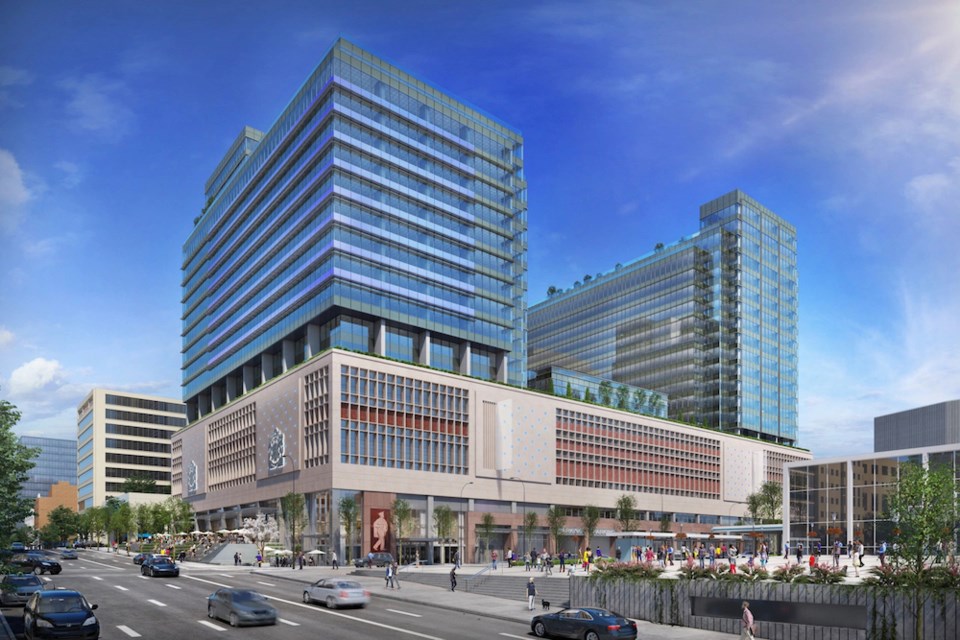The latest round of tech sector layoffs this week at Amazon.com Inc. is fuelling speculation that office space could become readily available in the downtown core, creating opportunities for new entrants unable to fit in during the tech boom spawned by the pandemic.
“It’s happening across Vancouver. We’re foolish to think it won’t come to Vancouver,” Wayne Berger, CEO, Americas at co-working provider IWG plc said of the return of office space by tech companies during a panel discussion commercial real estate association NAIOP hosted November 17.
In September 2020, Amazon said it would be the sole tenant of the office component of The Post redevelopment at 349 West Georgia Street. The deal with QuadReal Property Group gave it 1.13 million square feet, where it expected to employ 6,000 people.
This week, some of those employees began reporting that they’d been laid off and the panel at NAIOP anticipated a large volume of sublease space hitting the downtown in consequence.
Third-quarter statistics from CBRE Ltd. estimate sublease space in the downtown core at 428,369 square feet, or 24.4 per cent of total downtown vacancies.
Amazon Canada spokesperson Kristin Gable told Western Investor that Amazon is holding the course on its lease commitments.
"The South Tower at The Post is nearly complete and we plan to welcome employees into their new office space in June 2023," she said, noting that the only change might be a reconfiguration of the floor layouts.
Amazon also intends to occupy the building's north tower when it completes in 2024, she added.
Brokers are largely unconcerned at the prospect of Amazon returning space to the market. A large sublease opportunity would cater to a very limited tenant base.
“It will be so big there will be maybe one or two other tenants that can deal with it,” said Luke Moran, who oversees leasing with Reliance Properties Ltd. “It will be such an albatross that it won’t affect anything.”
According to Berger, just one tenant has been securing space on anything like the scale needed to backfill any space relinquished by Amazon – Bytedance Inc., the Chinese company best known for the TikTok social media platform.
“They’re the only company I can think of that’s taking surprising amounts of space – primarily in the U.S. right now, but I don’t know why they wouldn’t look at Vancouver,” he said.
CoStar Group statistics indicate that ByteDance has signed three deals representing 430,000 square feet of space in the U.S. since the pandemic began. The most recent deal was signed in May 2022, and occupancy of the final portion of space, 71,000 square feet in Washington, DC, is scheduled for June 2023.
ByteDance has yet to take space in Canada. It did not immediately respond to a request for comment this week regarding its intentions in Canada.
Berger expects any beachhead in Canada would start at 20,000 square feet before the company scaled up.
Many tech companies are dealing with the current uncertainties by taking advantage of co-working space to manage their requirements.
IWG is working with a large number of companies that are trying to rationalize their lease portfolios by 10 to 30 per cent, Berger said. A typical arrangement sees IWG take over the excess space, offering it as co-working space through the end of the lease.
“We’ve continued to look to grow in the market because the demands from tech are coming to us,” he said. “They’re moving away from capital leases because of the liability, and also the movement towards flexibility.”
Good-quality sublease space is in demand, said Chuck We, senior vice-president, Western Canada, with Hudson Pacific Properties Inc. Space that returned to the market this summer disappeared relatively quickly, and he expects steady absorption of any fresh blocks of space that hit the market.
“Good spaces with good sublandlords … those ones will move, and I think that’s the healthy churn in the market,” he said.



